-
About
- About Listly
- Community & Support
- Howto
- Chrome Extension
- Bookmarklet
- WordPress Plugin
- Listly Premium
- Privacy
- Terms
- DMCA Copyright
- © 2010-2025 Boomy Labs

 Educators Technology
Educators Technology
Listly by Educators Technology
A list of great posters for the classroom.
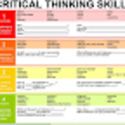
Critical thinking is an essential skill in our life.It is through thinking critically that we get to sideline our biases(cultural, racial,ethnic...etc) and see the clear picture.Critical thinking is a sort of meta-thinking, that is thinking about thinking.
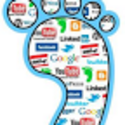
The last time I posted about Flipped Learning I got an email from an " angry" reader telling me that the concept of flipped learning is not new and that it was first coined by Dewy and Socrates long before it was rediscovered recently. Well this was a new piece of information for me.
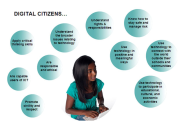
Each time I come across an interesting graphic I make sure it does not pass incognito. All of the visual graphics I share here in Educational Technology and Mobile Learning are informative and highly insightful. The one below is no exception. The graphic below features some of the characteristics of digital citizens which also apply to our students.

Are you planning to incorporate iPad into your classroom next school year ? You probably are already in search for the educational apps to use in your instruction, Educational Technology and Mobile Learning has a rich resource of the most popular educational apps you might need.
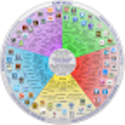
The buzz that the Modern Taxonomy Wheel generated over the last couple of weeks has not yet died out and now we have a new updated wheel from the same guy Allan Carrington. I love Allan's work and I find it really interesting.
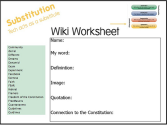
For as long as I can remember I have been an advocate for helping teachers understand the stages of technology integration to help them effectively use tech as a tool for learning.
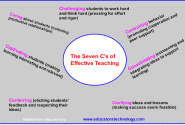
Below is a graphic I created based on an article published in Edge under the title" 7 Cs for Effective Teaching ". The person behind these 7 Cs is Ronald Ferguson from the Harvard Kennedy School . He is an educational researcher who presented his work on teacher effectiveness in a recent keynote in an educational assessment conference.
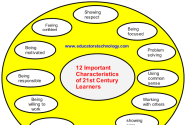
Megaskills: Building Our Children's Character and Achievement for School and Life is a wonderful book from the popular author Dorothy Rich. In this grandeur work Rich provided several tips and pieces of advice that were proven to help children develop the basic values and character strengths they need to succeed in school and beyond.
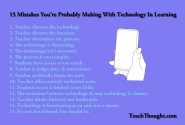
Teachthought has created this wonderful graphic featuring 15 mistakes teachers should avoid when using technology. Going through these mistakes I found them similar to the the distinction we made in an earlier post about the use of technology versus technology integration in education.
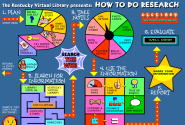
Below is graphic that I have used in several presentations and in different workshops. This graphic has been created by Kentucky Virtual Library and is meant to walk students throught the process of doing research from A to Z.
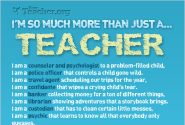
Teachers, I believe, are fountains of inspiration for everybody around them and most important of all for their students.They are the symbols of that burning candle that never ends and the more it gives the lighter it makes its surroundings. Teaching is a job that requires a lot of emotional commitment and a never-ending investment in human capital.
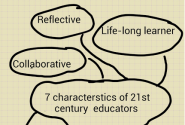
Inline with what I talked about in yesterday's post" 23 roles of today's educators", the graphic below is an extension of this discussion. It is basically inspired by a great read from Teach Amazing under the title 7 Characteristics of an Innovative Educators by Rachell Wootten.
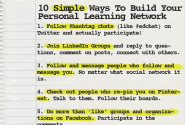
Below is a wonderful work done by Jeff Dum from Edudemic featuring 10 simple ways to help teachers set up their personal learning networks. I have been profusely writing on this topic and the latest articles in this regard include: Going through the tips included in this graphic I found them really interesting and worth sharing with you here.
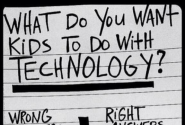
I just came across this graphic on Twitter and it straightforward picked my interest. I was contemplating the deep meaning it communicates and could not agree more. The message is clear: technology is a means and not an end.
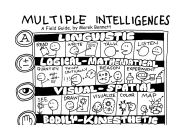
Comics workshop has these two awesome posters to share with you. They illustrate in a comic way the theory of multiple intelligences as conceptualized by Howard Gardner. I have already posted several graphics on this theory in the course of this school year and I am pretty sure the ones I have for you below will be a great addition.
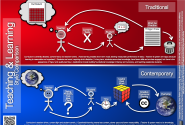
With this free access to information, there emerged some new learning styles. Most of these styles are self-dependent. To cater to these emerging learning needs teachers need to adopt a more student centered approach to their instruction.
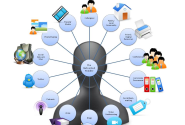
I have just started reading the book after the last scheduled in my reading list for this month and I must say that this is the best of the titles I am reading in June.
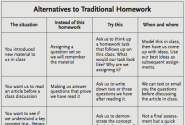
I just came across this chart somewhere online and find it really interesting and worth sharing with you here in Educational Technology and Mobile Learning. The chart is created by connectedprincipals and features some alternative ways to do "traditional' homework.
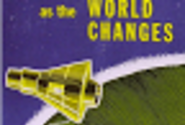
This selection of posters I am sharing with you today are for the library media center. Those of you working in libraries will find them really useful. These graphics have been created by Julie Greller from media specialist guide. The original list contains 40 posters but I am sharing only the best 7 that stood out for me.
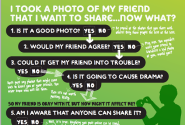
The Digital Citizenship page I started here almost a year ago is now growing bigger and bigger and contains all kinds of resources teachers would need to effectively instruct their students on this concept. Part of what we talked about in yesterday's graphic is the importance of students being aware of what they share on social media websites.
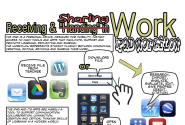
Developing and maintaining a productive workflow while using iPad is not an easy thing to do. It does not only take knowing and installing all the necessary apps, students need to build a momentum , working on their apps and using them judiciously. Building such a momentum is a process of habituation that calls for repeated actions.
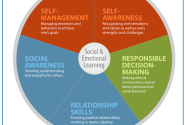
In the midst of this technological revolution that is redefining the concept of 21st century education, one is left to wonder if 21st century skills are only about digital literacy skills. On the face of it, it looks like the digital component is taking the lion's share in today's instruction but as I have argued before in several previous posts, we are teaching human beings and not machines.
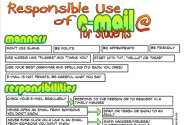
You might think of email literacy as old school particularly with the huge embrace of mobile technology and smart devices, yet students still require an explicit instruction on how to handle their emails appropriately. I am talking here about the use of emails in academic settings like in schools, with teachers, administrators...etc.
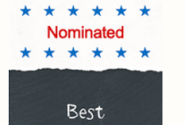
Barbara Bray and Kathleen McClaskey are co-founders of Personalize Learning, LLC who compared the terms Personalization vs Differentiation vs Individualization to dispel some of the myths and confusion around those terms. Since their first version of this chart in January 2012, it has been downloaded over 100,000 times.
